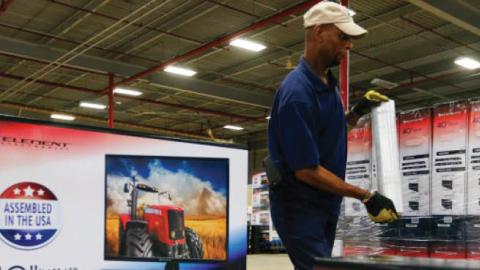During his Labor Day press conference, President Trump aired his principal grievance regarding American manufacturing: There is not enough of it. The president plans to “make America into the manufacturing superpower of the world” by offering tax credits to companies that open factories in the United States, directing the federal government to purchase more products made in the U.S., and imposing tariffs on companies that move their domestic facilities offshore.
He also described his policy as a way to confront China, announcing his intention to “end our reliance on China once and for all” and even hinting at going further than that. Noting the policy discussion about cutting economic ties with China, the president mused, “Decouple, it’s an interesting word. . . . You’ll start thinking about it.” Election seasons lead politicians to prioritize jobs at home over interests abroad, but the second Trump administration has an opportunity to enhance American manufacturing and punish Chinese malfeasance without incurring the costs associated with pure protectionism.
There are good reasons, for instance, to find alternative sources for critical intermediate parts and finished goods. As the spring’s shortage of protective equipment showed, depending on a few producers for just-in-time delivery of vital equipment is inherently risky. It would be folly to again place American lives in jeopardy any time China is affected by disease, natural disasters, or other emergencies — not to mention war.
China also uses trade policy not merely to privilege its companies unfairly, but also to directly harm other countries. During a territorial dispute in 2010, Beijing halted exports to Japan of raw materials vital to high-tech manufacturing, and more recently imposed heavy tariffs on Australian goods after Canberra publicly requested an independent investigation into the Chinese government’s actions at the beginning of the pandemic. Last month, a prominent Chinese academic reiterated that if the trade war gets too costly, China could restrict pharmaceutical exports and bring the American medical system to its knees. As competition between the United States and China intensifies, Americans who feel the pinch in only their wallets will be counted as fortunate.
Although reshoring some manufacturing with direct national-security implications is prudent, bringing back all production would be a costly mistake. American workers tend to be very productive, in part because they are better educated and use more advanced technology than their peers, and they expect to be paid accordingly. Using expensive labor for goods that do not require it would make Americans poorer and undermine Trump’s other priorities. He has boasted about his attempts to cut prescription-drug prices. Does he really want to undo that by moving all pharmaceutical manufacturing back to the United States?
Fortunately, there are other ways to meet his goals. The trade ministers of Australia, India, and Japan recently pledged to cooperate on making their supply chains more resilient. Although they will reshore some factories, they will also build in other countries to reduce their vulnerability to local disruptions. Tokyo, for example, is subsidizing companies that move from China to not only Japan, but also to India, Bangladesh, and other designated countries.
Joining with these allies and partners makes economic and strategic sense. Many of China’s neighbors prefer the security environment the United States has created, but China’s economic clout gives Beijing tremendous leverage. Ensuring that countries in the Indo-Pacific have other, better sources of trade and investment will reduce China’s influence in a region as consequential to the 21st century as Europe was to the 20th. Wealthier partners can also play a bigger role in their own defense, which would allow the United States to shoulder less of the load.
It could bring other economic advantages as well. Because the United States produces relatively fewer consumer goods, many believe that American manufacturing output has declined. This is not true (American manufacturing still accounts for roughly the same share of the U.S. economy as it did at the end of World War II), but our high-tech companies and skilled workforce now specialize in complex, expensive products such as aircraft and the machine tools that other factories use to produce cheaper wares. As companies move their production lines out of China, they will need new factories and new tools. The imminent wave of reshoring is a golden opportunity for machine-tool exporters, and the United States should take advantage of this opportunity by joining with its partners and allies to build a stronger and better supply network. The administration should make sure that American industry gets opportunities to sell goods in exchange for its expertise and financing.
Amid a global pandemic and calamitous depression, the last thing most Americans need is for their purchasing power to shrivel. Washington can protect the American people from foreign calamities without bankrupting them.
Read in National Review















